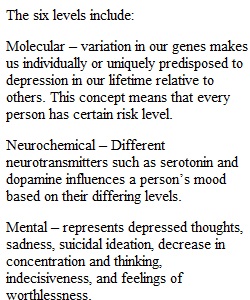


Q Please complete the Lesson questions and uploadsubmit them in Blackboard for grading. Be sure to keep all your lessons/answers for studying purposes as you prepare for our first exam. Chapter 1 Lesson Questions: 1. Briefly describe the 6 levels of cause, analysis, and treatment of DEPRESSION we discussed on our Powerpoint presentation. Remember, psychopathology and psychological traits are complex traits with “biopsychosocial” influences! 2. Differentiate among the three women pioneers in psychology and list their noted accomplishment. 3. List and describe (in your own words) the 6 Historical Psychological Perspectives. (Hint: describe the “subject matter” and “basic premise” in your own words). 4. Describe the field of “Positive Psychology”. 5. Please list and describe at least 4 of the numerous areas of research in the broad, diversified field of psychology. 6. List and describe each of the 7 Themes related to field of psychology. ****What “psychological” MYTH did you find MOST interesting in Table 1.1 (and listed below)? Table 1.1. Popular Myths Related to Psychology: *Most people use only 10% of their brain power. *Playing Mozart's music to infants boosts their intelligence. *Hypnosis is a unique "trance" state that differs in kind from wakefulness. *Hypnosis is useful for retrieving memories of forgotten events. *The polygraph ("lie detector") test is an accurate means of detecting dishonesty. *Opposites attract: We are most romantically attracted to people who differ from us. *People with schizophrenia have multiple personalities. *A large portion of criminals successfully use the insanity defense.
View Related Questions